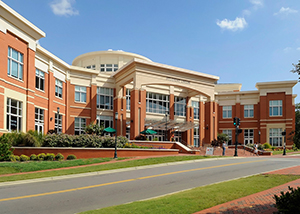UNC Charlotte Revamps Wireless Network to Support Mobile Devices, Ed Tech and More

UNC Charlotte (photo: Business Wire)
A dramatic increase in the number of wireless devices on campus, coupled with heightened demand for new technologies in the classroom, led the University of North Carolina at Charlotte to upgrade its wireless infrastructure. The institution is deploying an Aruba Networks 802.11ac Wave 1 and Wave 2 wireless LAN to meet the connectivity needs of its 31,000 students and staff.
"Like most universities, we have seen an explosion in WiFi usage on campus with the influx of 'GenMobile,' who have a strong preference for mobility in terms of the devices they use and their 'anytime, anywhere' approach to schoolwork and entertainment. Today, our students carry an average of three devices on campus and we expect that figure to climb as wearables grow in popularity," said Michael Carlin, CIO for UNC Charlotte.
After a proof of concept evaluation in two of the densest locations on campus, UNC Charlotte selected Aruba for its ability to support high data speeds and device densities. The university is primarily deploying Aruba's 320 APs — 802.11ac Wave 2 models with dynamic multi-user multiple input/multiple output (MU-MIMO) grouping. With the company's MU-MIMO aware ClientMatch technology, the APs can group Wave 2-capable devices on the same stream, boosting network capacity. The 320 series also integrates a Bluetooth Low Energy Beacon, which enables indoor location and wayfinding, proximity-aware push notifications and other location-based services.
The university will use Aruba's ClearPass Policy Manager for both wired and wireless network access control, and the company's AirWave product will provide network management with granular visibility for the entire infrastructure.
According to UC Charlotte faculty, the wireless revamp will enable a wider range of educational technologies. "With my large courses, the wireless network enables me to perform in-class proctored testing on Moodle," said Bret Wood, a professor in the Department of Kinesiology. "In my smaller courses, all of the students use tablet technology for app-based learning, shared communications, on-the-fly presentations, quizzing and testing. A robust WiFi network is critical to enabling these classroom innovations and improving student learning."
The new infrastructure will also support a planned conversion of 60,000 square feet of dedicated computer labs to flexible, multi-functional teaching spaces that support active, collaborative learning. The university may also extend wireless access to its outdoor Jerry Richardson Stadium and indoor Dale F. Halton Arena.
"With our new Aruba infrastructure, including the Wave 2 APs, there are a host of exciting new possibilities for enhancing the overall on-campus experience for our students, faculty and guests," said Carlin. "We are already investigating ways to use the APs' built-in beacons to deliver location-relevant information and student services in the library and at other sites on campus."
About the Author
Rhea Kelly is editor in chief for Campus Technology, THE Journal, and Spaces4Learning. She can be reached at [email protected].